
SWAMI SARVAPRIYANANDA
II. Advaita Vedanta: The Self as the Absolute
The body-mind are taken to be the self and their inherently unstable and incomplete nature gives rise to desire. Action done in the pursuit of desire binds us in karmic consequences, which generate repeated births and deaths. Correction of this error of identifying the self with body-mind will lead to cessation of desire, action and the results of actions (the cycle of repeated births and deaths), thus delivering us from suffering.
The Advaita Vedanta claim about the self can be summarised briefly. The real nature of the self (Atman) is said to be pure being (Sat), pure consciousness (Chit) and pure bliss (Ananda) – the Absolute (Brahman). Being, consciousness, and bliss are not the attributes of the Absolute but its very nature. Brahman is nondual – there is no second reality apart from It. Brahman is infinite i.e, not limited by time or space. Even though Atman is identical with Brahman, the term Atman is not superfluous as it is not enough to know that there is Brahman. Enlightenment is the Realisation that the self (Atman) is the Absolute (Brahman). It is of the form, ‘I am Brahman’ (Aham Brahmasmi).
Diese Geschichte stammt aus der February 2023-Ausgabe von The Vedanta Kesari.
Starten Sie Ihre 7-tägige kostenlose Testversion von Magzter GOLD, um auf Tausende kuratierte Premium-Storys sowie über 8.000 Zeitschriften und Zeitungen zuzugreifen.
Bereits Abonnent ? Anmelden
Diese Geschichte stammt aus der February 2023-Ausgabe von The Vedanta Kesari.
Starten Sie Ihre 7-tägige kostenlose Testversion von Magzter GOLD, um auf Tausende kuratierte Premium-Storys sowie über 8.000 Zeitschriften und Zeitungen zuzugreifen.
Bereits Abonnent? Anmelden
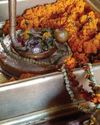
Panchakroshi Parikrama of Varanasi
At the snow-capped Kailas, the Divine Lord Shiva was seated with Mother Parvati.
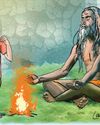
Gadai and the Monks
A fictional narrative based on incidents from the childhood of Sri Ramakrishna.
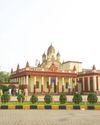
Chintayo momo maanosho Hori...
Sri Ramakrishna loved songs. There probably was no normal day when he did not sing some songs.
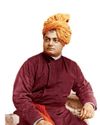
The Vedanta Vaccine
The world is still struggling under the impact of the pandemic due to Covid-19 for the last three years.
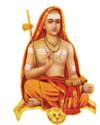
Chandrakirti's Chariot: Self in Madhyamaka Buddhism and Advaita Vedanta
The goal in Advaita Vedanta is the cessation of suffering and the attainment of true fulfillment. Suffering, according to this school, is due to ignorance of the true nature of the self and consequent erroneous identification with the body-mind.
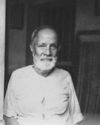
Reminiscences of Sargachhi
Question: यद्यदाचरतत श्रेष्ठसतत्तदरेवरेतरो जनिः। ‘Whatever a superior person does, others do the same thing!’ (Gita 3:21) – What does this statement mean?
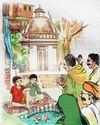
THE AUTUMN FESTIVAL
A fictional narrative based on incidents from the childhood of Sri Ramakrishna.
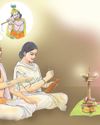
Bards of Guruvayur: Vilwamangalam II
Saints of India
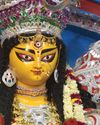
In the Universal Mother’s Divine Playground
Swami Vivekananda never taught the worship of Mother Kali. In a letter to Mary Hale he writes, “Kali worship is not a necessary step in any religion.
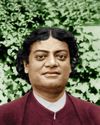
Swami Vivekananda: A Sportsman Par Excellence
In various books and articles, Swami Vivekananda has been called a spiritual leader, a prophet, a patriot, a social reformer, a philosopher, a yogi, a writer, an orator, an educationist, a musician, and so on.